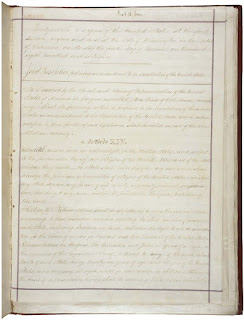“Athens became the seat of politeness and taste, the country of orators and philosophers. The elegance of its buildings equalled that of its language; on every side might be seen marble and canvas, animated by the hands of the most skilful artists. From Athens we derive those astonishing performances, which will serve as models to every corrupt age. The picture of Lacedæmon [a. k. a. “Sparta”] is not so highly coloured. There, the neighbouring nations used to say, ‘men were born virtuous, their native air seeming to inspire them with virtue.’ But its inhabitants have left us nothing but the memory of their heroic actions: monuments that should not count for less in our eyes than the most curious relics of Athenian marble.”
– Jean-Jacques Rousseau, “A Discourse on the Arts and Sciences” (1750), First Part
Jean-Jacques Rousseau, an eighteenth-century admirer of the Spartans
A number of people have praised the Spartans – including Rousseau, Machiavelli, and Hitler …
Many centuries after the Spartans,
Jean-Jacques Rousseau once praised their culture in his
“Discourse on the Arts and Sciences.” He said that the memory of Sparta's heroic actions “should not count for less in our eyes than the most curious relics of Athenian marble” (as cited above).
Niccolò Machiavelli was another
philosopher who praised the Spartans. (See the footnote to this blog post for the details of this.)
American colonists and
French revolutionaries have sometimes been among those who praised the Spartans. In modern times, some liberals have also praised Sparta for what they perceive as its “greater respect” for
women’s rights. And, as the presenter of this documentary notes,
Adolf Hitler also praised the Spartans, with
Nazi Germany using them as a model of sorts – particularly in their use of
eugenics. (See the
Wikipedia page on “Laconophilia,” or the “love of Sparta,” for some of the details of this.)
Adolf Hitler, a twentieth-century admirer of the Spartans
… while Alexander Hamilton considered Sparta to be “little better than a wellregulated camp”
Ironically, Sparta was admired even by some from its arch-rival
Athens, the other great superpower of
Ancient Greece. The Spartans actually believed that they were creating a
“utopia.” But if anything, it seems to have been closer to the other end of the spectrum – a
dystopia.
Alexander Hamilton wrote in the
Federalist Papers that “Sparta, Athens, Rome, and Carthage were all republics; two of them, Athens and Carthage, of the commercial kind. Yet were they as often engaged in wars, offensive and defensive, as the neighboring monarchies of the same times.
Sparta was little better than a wellregulated camp; and Rome was never sated of carnage and conquest.” (Source:
Federalist No. 6) Thus, although he recognized Sparta as a
“republic,” Hamilton considered Sparta to be “little better than a wellregulated camp” (an accurate summation). This documentary shows that the truth about Sparta is less romantic, and far less flattering, than the description offered by
Rousseau. It acknowledges the rights of women in Sparta, even as it repeats tired old myths about how women actually had more rights in Sparta than they did in
Athens (although I should acknowledge that they were still second-class citizens in both). But as this documentary notes, Sparta was “no feminist paradise.” It was a hellish
dystopia (as mentioned earlier), with no real concept of human rights. It killed those boys that it deemed “weak,” denying them any future chance to redeem themselves for the unforgivable “crime” of
weakness.
Jean-Pierre Saint-Ours’s “The Selection of Children in Sparta,” painted 1785













